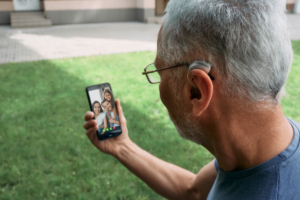In early 2026, New York is poised to make history with the enactment of its…
 According to the National Institutes of Health (NIH), hearing loss affects one-third of older adults. As difficulty hearing can lead to communication challenges and social withdrawal, it can also increase the risk of dementia. Dementia includes diseases affecting memory, thinking, and the ability to perform daily activities and affects 55 million people worldwide, per the World Health Organization.
According to the National Institutes of Health (NIH), hearing loss affects one-third of older adults. As difficulty hearing can lead to communication challenges and social withdrawal, it can also increase the risk of dementia. Dementia includes diseases affecting memory, thinking, and the ability to perform daily activities and affects 55 million people worldwide, per the World Health Organization.
Hearing loss accounts for 8 percent of the world’s dementia cases. The Alzheimer’s Association estimates that global dementia cases will triple by 2050.
Why wear Hearing Aids for brain health?
Hearing aids could reduce the risk of cognitive decline in older adults experiencing hearing loss. A review of several studies also revealed that hearing aid use lowers the risk of dementia by 19 percent across 2 to 25 years. Using hearing aids for a short time was associated with a 3 percent advancement in cognitive test scores.
Access to hearing aids is essential for seniors at risk of cognitive problems. A study published in The Lancet found that giving audiological counseling and hearing aids to older adults at increased risk for cognitive decline lessened the development of cognitive impairments over a three-year period.
How can I receive Over-the-Counter Hearing Aids?
For older adults experiencing hearing difficulties, over-the-counter (OTC) hearing aids could improve quality of life, preserve social connectedness, and prevent cognitive decline. Following the Food and Drug Administration’s recent approval, devices for adults with mild to moderate hearing loss became available without a prescription in October 2022.
Where can I buy Over-the-Counter Hearing Aids?
OTC hearing aids are available in drug stores such as Walgreens and CVS, as well as online pharmacies. Other sellers include Best Buy, Walmart, and Hy-Vee.
Who can benefit from Over-the-Counter Hearing Aids?
If you or a loved one are older, experiencing cognitive difficulties, and facing barriers to accessing health care, an OTC hearing aid could help improve your daily life and reduce the risk of developing dementia. Since OTC hearing aids are available without a prescription, those who cannot afford a prescription hearing aid may obtain hearing aids for mild to moderate hearing loss directly from a store.
Those with significant hearing loss will need prescription aids from their otolaryngologist. Yet others who may have difficulty hearing in crowded areas or on the phone but do not have severe hearing impairments could benefit from an OTC hearing aid.
The average cost of a pair of OTC hearing aids is $1,600, about $3,000 less than prescription devices, according to the National Council on Aging’s recent report on the best OTC hearing aids. This makes OTC hearing aids a more affordable option for older adults with mild to moderate hearing loss.
How do Hearing Aids work?
Hearing aids have microphones that receive sounds. An amplifier increases the sound’s strength in the wearer’s ear. By receiving and amplifying sounds, hearing aids allow individuals to detect sounds and maintain conversations.
What are the risks of not using a Hearing Aid?
The NIH reports that fewer than a third of adults aged 70 and older who could benefit from hearing aids use them. Given the relationship between hearing loss and cognitive decline, forgoing a hearing aid could put you at greater risk of developing dementia.
Without a hearing aid, some find engaging in social interactions with friends and family increasingly difficult and may not want to be around people as frequently. Johns Hopkins Medicine has identified social isolation as a factor contributing to cognitive deterioration.
An OTC hearing aid could help you stay engaged in conversations with others, fostering a sense of social support and community that protects against cognitive decline.
For those who may have trouble accessing a prescription hearing aid, OTC hearing aids are an alternative that could prevent dementia. If you or a loved one experiences hearing loss, consider whether a hearing aid could help.
If you would like to speak with an experienced elder law attorney regarding your situation or have questions about something you have read, please do not hesitate to contact our office at 1 (800) 680-1717. We look forward to the opportunity to work with you.




Comments (0)